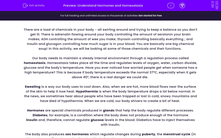There are a load of chemicals in your body - all swirling around and trying to keep a balance so you don't get ill. There is adrenalin flowing around your body controlling the amount of serotonin your brain makes; ADH controlling the amount of wee you make; thyroxin controlling basically everything ; and insulin and glucagon controlling how much sugar is in your blood. You are basically one big chemical soup! In this activity, we will be looking at some of those chemicals and their functions.
Our body needs to maintain a steady internal environment through a regulation process called homeostasis. Homeostasis takes place all the time and regulates levels of oxygen, water, carbon dioxide, glucose and the body's temperature. Have you ever noticed how worried people get when someone has a high temperature? This is because if body temperature exceeds the normal 37°C, especially when it gets above 40°, there is a real danger we could die.
Sweating is a way our body uses to cool down. Also, when we are hot, more blood flows near the surface of the skin to help it lose heat. Hypothermia is when the body temperature drops a lot below normal. In the news, we sometimes hear about people who have been trapped or lost in cold, snowy mountains and have died of hypothermia. When we are cold, our body shivers to create a bit of heat.
Hormones are special chemicals produced in glands that help the body regulate different processes. Diabetes, for example, is a condition where the body does not produce enough of the hormone insulin and, therefore, cannot regulate glucose levels in the blood. Diabetics have to inject themselves with insulin.
The body also produces sex hormones which regulate changes during puberty, the menstrual cycle (in girls and women), and reproduction. Ovaries in females produce oestrogen and progesterone, whereas testes in males produce testosterone.
Hormones also regulate various processes in plants, like growth of shoots, roots and flowers, and ripening of fruit. The most important hormone in plants is auxin.
Now let's move on to some questions on this topic.
Want a bit more help with this before you begin? Why not watch this short video?








